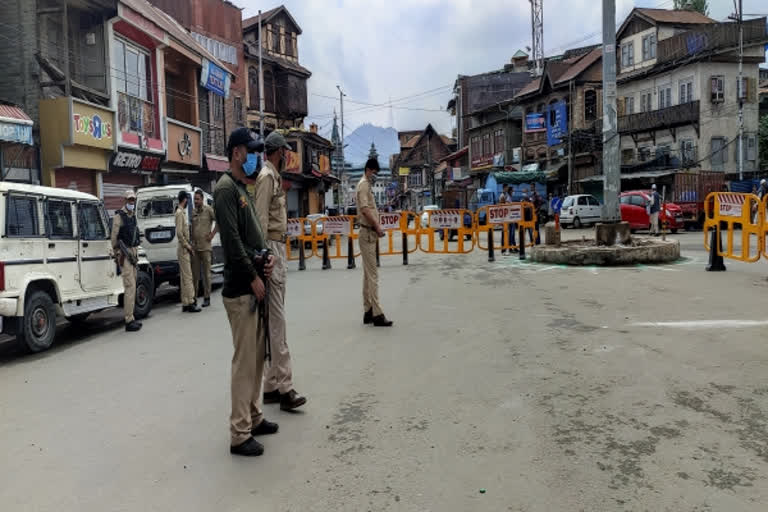Srinagar (Jammu-Kashmir): Jammu and Kashmir administration on Tuesday imposed restrictions in the Union Territory to prevent people from paying respect at the graves of the 22 unarmed Kashmiris, who were killed on this day in 1931 by soldiers of the last Maharaja of Jammu and Kashmir. The security forces blocked the roads leading to the martyrs' graveyard in Srinagar's downtown. The graveyard, called Martyrs’ Graveyard, is located in the lawns of a shrine built in the memory of central Asian Sufi saint, Khwaja Sayed Bahauddin Naqashband Bukhari, the founder of the Sufi Naqshbandi order. A semi-armoured vehicle, a police vehicle stood and deployment of security forces personal was seen on the main crossroads leading to the shrine whose gate had been locked.
Until August 2019, when the Centre scrapped Jammu and Kashmir's special status, July 13 was observed as a state holiday. Interestingly, the Jammu and Kashmir government, mainstream political parties and separatist parties used to observe this day and would shower the graves with flowers and offer prayers. But the centre, last year, dropped the day from the list of state holidays, heeding to long-standing objections by people in the Jammu division, who consider the last autocratic ruler Hari Singh as a hero. At least 22 unarmed men were shot dead outside the Central Jail in Srinagar by the state forces after they refused to disperse and were protesting as Abdul Qadeer Khan, believed to be a resident of the Swat region, now in Pakistan, was being tried for treason and incitement to violence.
READ: J&K: Woman protests for jailed husband's release, claims he's innocent
According to historians, Abdul Qadir suddenly appeared in the Jama Masjid of Srinagar and raised his voice against the atrocities of the Dogra rulers, after which there were demonstrations in various places in the city. Authorities immediately arrested Abdul Qadir immediately and put him behind bars in Central jail. According to some, he had arrived in Kashmir with a British tourist and was staying in a houseboat where he heard about the atrocities on the Kashmiri people. Some historians say that the incident of July 13 is an important cornerstone of the Jammu and Kashmir movement, as on the day the Kashmiri people rose up against state atrocities.
Meanwhile, the National Conference president and member of parliament, Dr Farooq Abdullah paid tributes to the martyrs. A statement issued by the party read, "In view of the restrictions imposed by the administration on the occasion of Martyrs' Day, Farooq Abdullah today paid tributes to all the martyrs at the party office in Srinagar." The statement added that "Quran and Fateha were also recited on the occasion. Apart from Farooq Abdullah, other senior leaders of the party were also present on the occasion."



